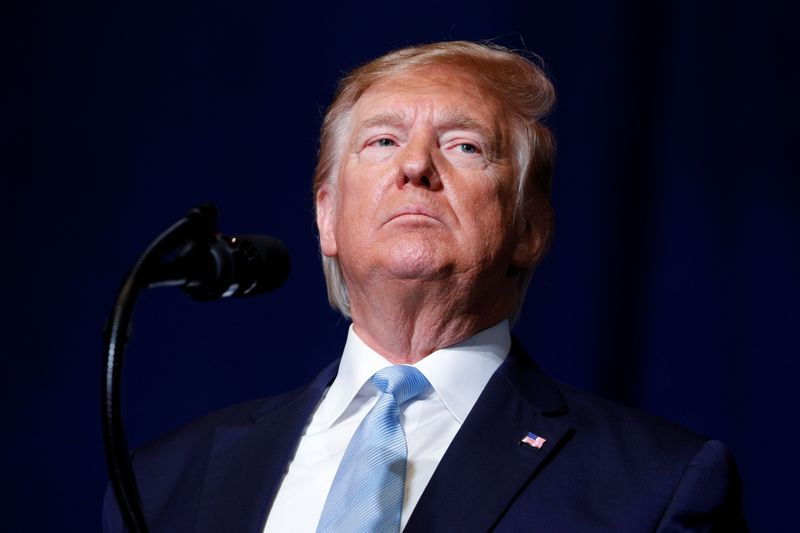By Jonathan Landay, Steve Holland, Matt Spetalnick and Phil Stewart
WASHINGTON (Reuters) - U.S. security services had tracked Iran's top military commander Qassem Soleimani for years and on multiple occasions considered taking him out, current and former U.S. officials said, but they were always reluctant to act.
That was until early Friday in Baghdad, when a U.S. air strike killed Soleimani, who headed the overseas arm of the Revolutionary Guards and was regarded as the second most powerful figure in Iran after Supreme Leader Ayatollah Ali Khamenei.
President Donald Trump's order to carry out the targeted killing emerged from a series of high-level discussions over the past week, including a meeting with key members of his national security team on Sunday while Trump was vacationing at his Mar-a-Lago resort in Florida, the officials said.
The decision to strike – after U.S. officials opted previously to hold fire – stemmed from what senior officials described as compelling intelligence that Soleimani, a 62-year-old general, was planning imminent attacks on U.S. diplomats and armed forces in Iraq, Lebanon, Syria and elsewhere in the Middle East. They offered few details on the possible targets.
It was unclear how Trump and his aides had overcome earlier objections to such an attack on the grounds that it would risk thrusting the United States into another Middle East war that could engulf the region.
The killing of Soleimani - shortly after he arrived from Damascus, according to the White House - capped a week of fast-escalating hostilities between the United States and Iran.
For years, Soleimani had traveled the region, often under the eyes of U.S. military forces and intelligence agencies, seemingly unconcerned about the prospect that he could end up in their sights as he helped build up paramilitary proxies, alarming U.S. allies such as Israel, Saudi Arabia and Egypt.
A former senior administration official said Soleimani had shown "brazen" overconfidence, especially after the killing of an American contractor at a base in northern Iraq attacked by the Iran-backed Kataib Hezbollah militia, which prompted U.S. air strikes that killed 25 fighters.
"He gave us an excuse to take a shot," the former official said.
'TARGET PACKET OFF THE SHELF'
The decision to take out Soleimani followed Trump's hastily arranged meeting at Mar-a-Lago on Sunday with Secretary of State Mike Pompeo, Defense Secretary Mark Esper, national security adviser Robert O'Brien and Army General Mark Milley, the chairman of the Joint Chiefs of Staff, U.S. officials said, speaking on condition of anonymity.
Trump is presumed to have met his advisers in a windowless basement room built at the resort to provide a secure space for classified discussions.
It was after the storming of the U.S. embassy in Baghdad by pro-Iranian militiamen on Tuesday that the final order was given to "take the target packet off the shelf," said one of the officials.
The array of options included targeting leaders of Iraq's Popular Mobilization Forces, the collective name for Shi'ite militias, many of them backed by Iran, and offensive cyber operations, but the decision was ultimately made to hit Soleimani, the official said.
"This was a defensive action," O'Brien told reporters. "It was a very straight-forward decision for the president to make a call on this."
The strike on Soleimani's convoy as it left Baghdad's international airport also killed top Iraqi militia commander Abu Mahdi al-Muhandis, one of his advisers.
Another U.S. official said Soleimani had been traveling throughout the region to authorize attacks on Americans that U.S. intelligence believed were in "late stage" planning.
U.S. officials told Reuters that Soleimani had long been considered an enemy with Americans' blood on his hands, including during the Iraq war that began in 2003 when hundreds of U.S. soldiers were killed by Iranian-made explosive devices. But until now they had opted against taking him out.
Soleimani had become a focus for the Trump administration prior to the latest violence. U.S. officials say consideration of a strike targeting him took place during the summer, after a series of attacks in the region blamed on Iran.
But planning for the strike matured in the wake of the U.S. contractors' death last week that Washington blamed on Iran. Tehran denied involvement.
Trump played golf with Republican Senator Lindsey Graham, a conservative hawk, on Monday at Trump International Golf Club in West Palm Beach, Florida.
"I was briefed about the potential operation when I was down in Florida. I appreciate being brought into the orbit," Graham told Fox News.
But senior Democratic lawmakers said they were not given their customary briefings ahead of such significant military actions. Many of Trump's Democratic critics called the Republican president reckless and said he had raised the risk of more violence in a dangerous region.

Trump insisted on Friday that he ordered Soleimani's killing "to stop a war," not to start one.